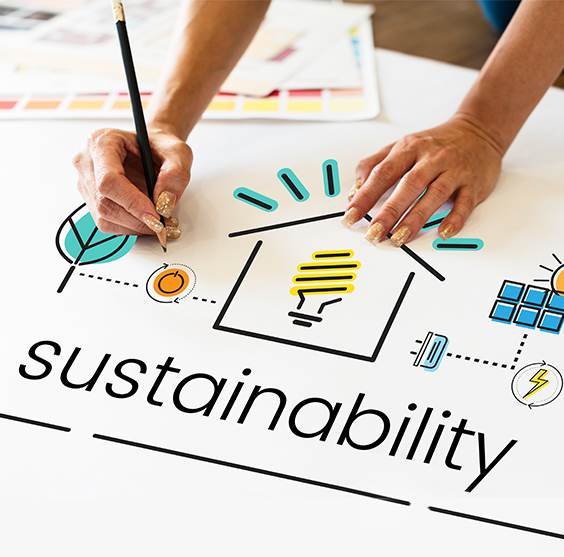Sustainability Communication
Sustainability is not an option. It's a necessity. And businesses that don't recognize this will be left behind
Paul Polman, former CEO of Unilever.
The Corporate Social Responsibility paradigm has shifted from “Relief and Rehabilitation” to “Sustainability” in recent years. It is the latest buzzword to be added to the corporate jargon.



Aligning the sustainability approach with your CSR efforts is not enough; you should be able to effectively showcase your transition as a sustainable brand to all your stakeholders. Communicating your sustainability efforts is equally important to enhance the business value of your sustainability initiatives.
Sustainability communication refers to sharing information about an organization’s sustainability efforts, including its social, environmental, and economic impact. Sustainability communication engages stakeholders, builds trust, and drives positive change toward more sustainable business practices.
Sustainability communication is one of the critical factors to be assessed to understand a company’s long-term health and financial performance metrics. ESG (Environmental, Social, and Governance) & Sustainability Communication is critical to show how you derive business value from your sustainability effort.
Corporations are increasingly judged on their ESG Reporting, Sustainability Communication, and sustainable finance initiatives. Investors look at these to build their responsible investment portfolios.

Today, businesses are judged on their efforts to create a positive and sustainable impact on the environment and society. Equally important is the way they communicate these efforts to their stakeholders. Here are several reasons why sustainability communications are essential for businesses:
To meet stakeholder expectations
To demonstrate corporate responsibility
To comply with regulations
To drive innovation and cost savings
To contribute to the global sustainability agenda
Sustainability communication is a complex task involving expert consultation. It can be challenging for businesses for several reasons:
The complexity of sustainability issues
Sustainability issues are complex and interconnected, involving economic, social, and environmental dimensions. Communicating about these issues requires a deep understanding of sustainability concepts and their implications and the ability to convey this information in a clear and accessible way.
Diverse stakeholder interests
Sustainability communication must consider the interests and concerns of various stakeholders, including customers, employees, investors, NGOs, and regulators. These stakeholders may have different perspectives on sustainability issues and require additional information.
Need for transparency
Sustainability communication requires transparency and openness about organizational practices and performance. This can be challenging for organizations that have yet to be transparent about their environmental or social impacts.
Need for ongoing engagement
Sustainability communication is not a one-time event but requires constant engagement with stakeholders and continuous improvement in sustainability performance, and this requires significant resources and commitment from organizations.
Therefore, Sustainability communication requires a deep understanding of sustainability concepts, engaging with diverse stakeholders, and ongoing commitment to transparency and continuous improvement. It can be a challenging but essential aspect of sustainable business practices.

Do you need expert assistance for sustainability communication?
Develop a clear and effective sustainability communication strategy that aligns with their business goals and values.
Identify and engage with relevant stakeholders, including customers, employees, investors, regulators, and NGOs.
Measure & report on sustainability performance using recognized frameworks such as the Global Reporting Initiative (GRI) or Sustainability Accounting Standards Board (SASB).
Ensure compliance with relevant regulations and standards, such as ISO 14001 or the Carbon Disclosure Project (CDP).
Leverage sustainability communication to drive innovation and cost savings.
Expert assistance helps businesses communicate their sustainability efforts more effectively and transparently, build trust with stakeholders, and achieve their sustainability goals.

Sustainability communication and ESG (Environmental, Social, and Governance) communication are related but different concepts.
Sustainability communication refers to communicating an organization’s sustainability performance, goals, and initiatives to its stakeholders, including customers, investors, employees, regulators, and NGOs. This communication covers various sustainability issues, including environmental, social, and economic aspects.
ESG communication, on the other hand, refers to communicating an organization’s environmental, social, and governance performance to its investors. ESG factors are increasingly important to investors as they seek to understand the sustainability risks and opportunities associated with their investments.
While sustainability communication and ESG communication are different, they are complementary. Sustainability communication provides a broader picture of an organization’s sustainability efforts and their impact on society and the environment, while ESG communication focuses on the issues that matter to investors. Both are important for businesses to communicate their sustainability efforts transparently to their stakeholders.
By providing sustainability and ESG communication, organizations can demonstrate their commitment to sustainability and transparency, build trust with stakeholders, and attract investors looking for sustainable investments. Therefore, it is beneficial for businesses to have sustainability and ESG communication as part of their overall sustainability strategy.
Sustainability adoption within businesses is yet at a nascent stage and leaders, driving these changes, face a variety of challenges in their work. Some of the most common challenges include:
Therefore, Sustainability leaders must be able to navigate complex issues, build consensus, and drive change in the face of limited resources and competing priorities. These challenges require creativity, collaboration, and a deep understanding of sustainability issues and stakeholder needs.
A primer on the misconceptions about sustainability communications
Myth
Fact
Myth
Fact
Myth
Fact
Myth
Fact
Overall, sustainability communication is a multifaceted and essential aspect of the sustainability strategy for all organizations, regardless of size or environmental impact. It involves engaging with stakeholders, reporting on sustainability performance, and communicating about sustainability initiatives and goals transparently and authentically.

We at Crimson Cobalt are a dedicated professional team with over 3 decades of combined experience and a diverse range of clients, including multinational corporations, SMEs, and non-profit organizations. We help companies communicate their ESG performance to stakeholders.
As ESG communications Experts, we deeply understand sustainability reporting frameworks such as GRI and SASB and help clients develop sustainability reports, ESG disclosures, and other communication materials that meet these standards. We help businesses transition from a CSR approach to a more long-lasting SDG approach in engaging with the outer world.
Contact us to know more about how we can assist you with your requirements
Sustainability communications refer to the strategies and methods used to communicate sustainable practices, initiatives, and goals to various stakeholders such as employees, customers, investors, and the broader public.
Effective sustainability communications can help organizations to build trust with stakeholders, demonstrate their commitment to sustainability, and encourage behavior change toward more sustainable practices.
Sustainability communications should involve all relevant stakeholders, including employees, customers, investors, and the broader public. It is also important to involve experts in sustainability and communications to ensure that the messaging is accurate, relevant, and effective.
Examples of sustainability communications include sustainability reports, social media campaigns, public events, internal training programs, and stakeholder engagement activities.
The critical elements of effective sustainability communications include clear messaging, transparency, authenticity, relevance, and engagement.
Exploring a world of diverse topics and perspectives through informative and engaging articles.





